What did you accomplish during the deadliest year any of us have experienced? If you’re like me, you’ve accomplished the square root of jack squat. But you’ve probably consumed a lot of entertainment, perhaps even stuff you’d never gotten around to experiencing before. For me, my big “late discovery” was Star Trek.
I’m a nerd. (DID YOU KNOW?) For whatever reason, though, Star Trek never appealed to me enough to sit down and watch it properly. I had an interest in it from a historical standpoint — it’s an important part of television history, before we even consider whether or not it was any good — but that was about it. I figured I’d get to it eventually, but there was certainly no rush.
Then 2020 happened, and nearly all of my time was spent alone, indoors. If not under those circumstances, when?
Let me say one thing up front: I will not be reviewing each episode of Star Trek. A friend of the website — and all around ace human being — has done that already. She’s done it better and more thoroughly than I possibly could. Go read those. If you’d like to pretend I wrote them, just imagine they contain a lot more spelling errors. Instead, I think I’m just going to record some loose and disconnected thoughts as I go. Lucky you!
Anyway, Star Trek. It was the first iteration of the show — what we now call The Original Series, the Kirk ‘n’ Spock one — that interested me. I had and have no doubt that the later series are worth watching. People adore The Next Generation and Deep Space Nine sounds like it’s right up my alley. It’s The Original Series that I figured I should start with, though. Even if it were terrible, I at least knew I could enjoy its importance.
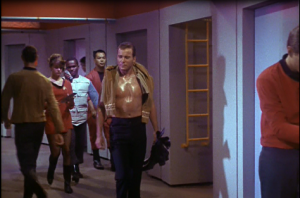 It’s taken me a few months to get through the first season. That’s because…well, I have to be honest here: Much of Star Trek is rough going.
It’s taken me a few months to get through the first season. That’s because…well, I have to be honest here: Much of Star Trek is rough going.
Prior to starting this proper watch through, my experience of The Original Series was limited to a few bits caught on TV here and there, some hand-selected episodes that were officially posted to YouTube around a decade ago, and The Motion Picture. When I tell people that, they say, “But that’s the worst movie!” Maybe that’s true, but I liked it; it didn’t sour me in any way toward whatever the show would or wouldn’t offer.
That was the entirety of my first-hand experience. I don’t remember why those episodes were posted to YouTube, but I imagine it was to celebrate some kind of anniversary. William Shatner provided some intro clips, but I don’t remember if I watched those. Some of the episodes I enjoyed. Some of them I did not enjoy. Nothing, apparently, encouraged me to sit down and watch the show from beginning to end.
Starting The Original Series in mid-2020, I wasn’t convinced I’d get much out of it. The season is very slow to start, and it’s clearly finding its footing. I mean that in every regard, by the way. The writing isn’t great. The actors don’t get much to work with. Characters change roles a number of times before they settle into their actual stations. (Or get ejected without comment.) The pacing is slow to the point that genuine boredom set in many times.
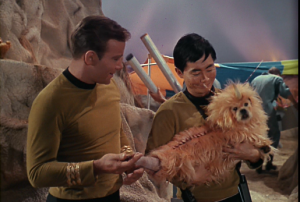 All of which…well…it’s a new show doing new things. It’s going Where No Man Has Gone Before. There’s bound to be some teething trouble. I’d find those things easier to excuse if there were interesting ideas behind them. Basically, I’d go easier on the execution if I recognized a strong vision or if it had compelling stories to tell. Maybe the show didn’t quite know how to tell its stories, but if they were worth telling, I’d sympathize with the difficulty it has in getting them out.
All of which…well…it’s a new show doing new things. It’s going Where No Man Has Gone Before. There’s bound to be some teething trouble. I’d find those things easier to excuse if there were interesting ideas behind them. Basically, I’d go easier on the execution if I recognized a strong vision or if it had compelling stories to tell. Maybe the show didn’t quite know how to tell its stories, but if they were worth telling, I’d sympathize with the difficulty it has in getting them out.
Instead, though, a long run of episodes in the first stretch can be boiled down to “something weird got on the ship.” It feels almost daringly uncreative. I realize that fans reading that sentence will think I’m being dismissive of the show, and I understand that perspective. Instead, though, I’m really just trying to convey my bafflement. The show isn’t uncreative, and yet it takes many, many episodes before it demonstrates its creativity in any narratively notable way.
Sitting down and setting an hour of my time aside to watch yet another installment in which Kirk and Spock try to identify and stop whatever weird something got onto the ship this time was not compelling to me. Each of those episodes, to some degree, had interesting ideas scattered around, but it felt so dull and repetitive that I’d have to make myself watch the show.
I’m glad I did, however, because around halfway through the season, something unpredictable happened: The show got very good, and reliably so.
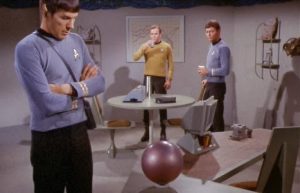 I’ll mention here that I’m going entirely by the running order on my BluRay box set. I understand that the episodes may have aired in another sequence, and they were certainly produced in another sequence, but around the rough midpoint of the season as I experienced it, things actually started to click. The stories got more creative. The characters started interacting more believably. I wanted to know what weird something would get onto the ship next because I could count on it being entertaining.
I’ll mention here that I’m going entirely by the running order on my BluRay box set. I understand that the episodes may have aired in another sequence, and they were certainly produced in another sequence, but around the rough midpoint of the season as I experienced it, things actually started to click. The stories got more creative. The characters started interacting more believably. I wanted to know what weird something would get onto the ship next because I could count on it being entertaining.
At the beginning of season one, I wasn’t quite sure why I was bothering. Now that I’ve hit the end, I’m excited about the prospect of season two.
All of which is to say that season one of The Original Series retroactively became a fascinating study of a show finding its footing. Of course, we’ve all seen shows struggle a bit at the start, but The Original Series finds its footing so slowly — with so many false starts and dead ends and lessons stubbornly unlearned — that it’s ripe for autopsy. Whereas most shows make the bulk of their mistakes off camera, The Original Series seems to be making every last one of them in public. I’m sure that’s incorrect, but compared to most shows it feels correct.
My intention here isn’t to beat up on Star Trek. Its accomplishments are genuine and rightly celebrated, but I will say that there are clear examples of the show not quite understanding itself.
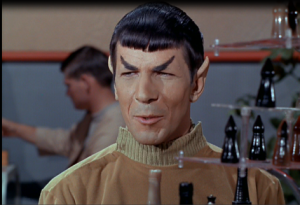 Sometimes it’s superficial. Spock’s Vulcan makeup gets less extreme (perhaps just better applied) as the season progresses. Also, he’s sometimes referred to as Vulcan and sometimes Vulcanian.
Sometimes it’s superficial. Spock’s Vulcan makeup gets less extreme (perhaps just better applied) as the season progresses. Also, he’s sometimes referred to as Vulcan and sometimes Vulcanian.
Even when terminology is consistent, the cast doesn’t always agree on how to pronounce it; it’s both Klingon and clingin’. Costumes change. The ship has a crusty old doctor with no personality until it gets McCoy, though the sequence of the episodes makes it feel like McCoy was the first doctor and was temporarily replaced. Yeoman Rand is an important recurring character until she vanishes and is replaced by rotating yeomen who are neither important nor recurring. Sulu was on the medical staff before he was suddenly, without explanation, the helmsman.
Then there’s The Guy Next to Sulu, the navigator, which is the most puzzling thing of all. I know Chekov shows up in season two, filling that role permanently, but how in the heck did that position survive all of season one without a regular actor?
This might take a bit of explanation, but bear with me, because it both irritated and fascinated me.
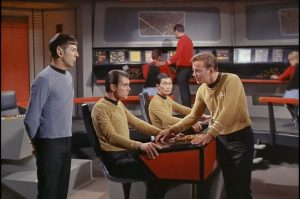 There are many miscellaneous crew members who dot the background, even on the bridge. That’s okay. I’d wager most of them only appeared in a single episode, but I can’t know that for sure because they’re rarely the focus of any given shot (and never the focus of any given scene). They come and go as extras do.
There are many miscellaneous crew members who dot the background, even on the bridge. That’s okay. I’d wager most of them only appeared in a single episode, but I can’t know that for sure because they’re rarely the focus of any given shot (and never the focus of any given scene). They come and go as extras do.
The navigator is another story. In every episode, a different person is in that seat, which is notable because that seat is near the center of the frame any time we get a good shot of the bridge. The navigator — whomever he is during any given week — is at the focus of many shots. What’s more, he’s sometimes even important to the plot. He gets lines. Kirk issues commands; he replies. He interacts with the others. He’s always a different person but he’s often involved with the larger goings-on.
Which means that — for each episode — they had to go through the trouble of finding somebody. Of auditioning him to make sure he could act. Of fitting him for a uniform and tailoring it to him. Of rehearsing with him. Of reshooting scenes when he inevitably botches his lines. It was a process to keep recasting that position. Surely at some point somebody would have said, “It would be easier to just cast one actor and keep him around.” Right? Well, maybe they did say that between season one and season two, but good lord, how did nobody say it sooner?
It’s strange. The easier solution — creating a character — was also the better one. They made it more difficult on themselves for no true benefit to the show, themselves, or the audience. Many positions on the ship had rotating crewmen, but this one was front and center in every episode. It’s bizarre.
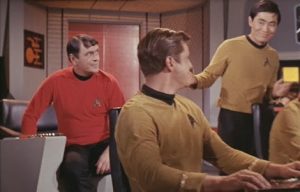 Of course, the lack of a recurring character means you could do stories in which that character has a memorable disappearance. I’m thinking of Bailey in “The Corbomite Maneuver” or — more notably — Gary Mitchell in “Where No Man Has Gone Before.” In neither case, though, did that character have to be the navigator. One just had to be kind of shitty at his job and the other only had to be on the bridge at an unfortunate moment. Those could be any position on the ship. And even if you disagree and feel that both characters had to be navigators for whatever reason, quietly rotating cast members for 29 episodes only so it could be important to two episodes is a monumentally lousy idea.
Of course, the lack of a recurring character means you could do stories in which that character has a memorable disappearance. I’m thinking of Bailey in “The Corbomite Maneuver” or — more notably — Gary Mitchell in “Where No Man Has Gone Before.” In neither case, though, did that character have to be the navigator. One just had to be kind of shitty at his job and the other only had to be on the bridge at an unfortunate moment. Those could be any position on the ship. And even if you disagree and feel that both characters had to be navigators for whatever reason, quietly rotating cast members for 29 episodes only so it could be important to two episodes is a monumentally lousy idea.
Again, though, I’m not intending to nitpick; as a study of television production and the creative decisions behind it, though, the omni-navigator is so odd and interesting to me. I can’t figure out the reasoning behind it, and I can even less understand the reason they didn’t cast someone the moment they realized the position might be an important one. There’s even precedent for it; as I mentioned, McCoy wasn’t originally the doctor, and Scotty and Sulu are both examples of permanent characters taking over previously rotating roles.
Ah well. Overall, once the series hit its groove at about the midway point, it got genuinely good. Okay, I admit not all of them were genuinely good, but they at least stayed interesting, and the characters were finally strong enough that it was worth spending time with them, even if you couldn’t care less about what any of them were actually doing.
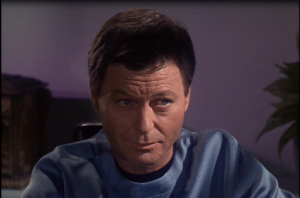 The biggest and most pleasant surprise to me was DeForest Kelley as Dr. McCoy, who is easily the best actor of the bunch. (Which I don’t say lightly. Read on.)
The biggest and most pleasant surprise to me was DeForest Kelley as Dr. McCoy, who is easily the best actor of the bunch. (Which I don’t say lightly. Read on.)
That was another puzzling thing to me; I’ve always heard people talk about Kirk and Spock in regards to The Original Series. Those were the two characters who took up the bulk of the discussion around the show. Every so often, to varying degrees, I’d also hear about Sulu, about Uhura, about Scotty. And that’s all fine and good, but why did I never hear much about Bones?
Sweet lord, McCoy is far and away the best part of the show. He’s the most consistently human and interestingly characterized person on the ship, at least so far. He’s competent but not infallible. He’s intellectual but able to fight back. He’s stern but fucking hilarious.
William Shatner and Leonard Nimoy also get a nice range of material to work with, but with Kelley, I rarely feel as if he’s acting. When he’s invested in his work as a doctor, I believe he knows what he’s doing. When he pushes back against his superiors because he disagrees with them on moral grounds, I believe in his convictions. When he deadpans a killer punchline, I believe that he knows exactly how funny he is but isn’t impressed with himself. There’s so much going on nearly every time Bones is on the screen, and I was always disappointed when he didn’t show up at all in an episode. This is the guy I would have liked to spend time with.
As I said, The Original Series stumbles with some of its characterizations. For the most part, though, those are confined to the season’s earliest episodes. By the midpoint, they’ve settled into who they are. By the end, they seem to be fully formed. Bones, weirdly, had the opposite trajectory. He arrived fully formed, then, at the very end of the season, the show wasn’t quite sure who he should be.
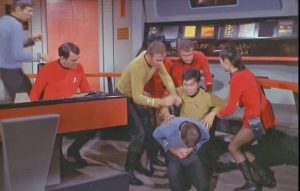 He goes from being reliably (and crucially) competent to being a fucking boob and getting dangerously close to being a shitty doctor. In “The City on the Edge of Forever,” he accidentally jabs himself with a needle, something no sober doctor has ever done in the whole of human history. In “Operation — Annihilate!” he blinds Spock as part of a medical experiment, learning a matter of seconds later that there was no need to do that.
He goes from being reliably (and crucially) competent to being a fucking boob and getting dangerously close to being a shitty doctor. In “The City on the Edge of Forever,” he accidentally jabs himself with a needle, something no sober doctor has ever done in the whole of human history. In “Operation — Annihilate!” he blinds Spock as part of a medical experiment, learning a matter of seconds later that there was no need to do that.
Don’t get me wrong, everyone has a bad day at work. But when it’s a doctor — and when that doctor’s bad days involve blinding crewmates and rewriting history so that the Nazis win the war — you really can’t write these things off as moments of inattention. He goes from being the crew’s prize asset to being its biggest liability.
That is, of course, a problem with the writing rather than the acting, and please allow me to say that the criticism I’ve been hearing for decades about terrible acting on The Original Series has been completely overblown. Nearly always, the moments of bad acting — which do exist — go hand in hand with bad writing. In short, nobody could deliver some of that dialogue effectively, and it’s wrong to blame the actors in those cases. When the writing is good, the actors inevitably rise to meet it.
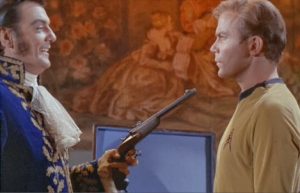 This is especially true of Shatner as Kirk, which surprises me because he’s usually the one singled out for ridicule. Shatner does excellent work most of the time, and serviceable work in nearly all other cases.
This is especially true of Shatner as Kirk, which surprises me because he’s usually the one singled out for ridicule. Shatner does excellent work most of the time, and serviceable work in nearly all other cases.
People like to poke fun at how stilted his line delivery can be, and his seemingly unnatural pauses, but in context there’s nearly always a reason. Sometimes it’s because he’s shifting between demeanors, moving from a personally emotional response to a professional response of leadership. His pauses indicate an internal effort to move from one “voice” to another. Out of context, it sounds like an actor struggling to deliver a line. In context, it’s a character sectioning off parts of himself and opening up others.
I’ve noticed also that the “unnatural pauses” come when Kirk is thinking on his feet, buying himself time. When he’s on the spot — and potentially in danger — he chooses his words carefully. He starts a thought not knowing where it will end up because he has to say something. A lesser actor would communicate this by saying “ummm…” or “well…” or stammering, but Kirk has enough control that he’s instead able to parcel out silence as he navigates his conversational way forward. Again, out of context it seems like the guy forgot his line. In context, it can be riveting, as we discover Kirk’s next bluff or linguistic feint right along with him.
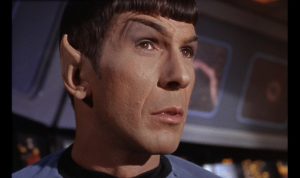 And since I’ve spoken about both McCoy and Kirk I might as well share my thoughts on Spock, which aren’t entirely solid at this point. I like Nimoy and I like the character, to be clear. What I like most, however, is how wonderfully his lack of emotion turns out to be bullshit.
And since I’ve spoken about both McCoy and Kirk I might as well share my thoughts on Spock, which aren’t entirely solid at this point. I like Nimoy and I like the character, to be clear. What I like most, however, is how wonderfully his lack of emotion turns out to be bullshit.
One other thing I did during 2020 was work my way through the Witcher books. (I’ve finished all aside from one stand-alone novel.) In those books, Witchers — like Vulcans — are said to be without emotion. Yet, it’s not true. Geralt, our Witcher protagonist, falls in love. He fondly raises a young girl entrusted to him. He cares about his mentor. He regrets many of his decisions. He frequently helps others not for coin or through obligation but because it’s the right thing to do.
And yet characters in that world meet him, assume he feels no emotion, and treat him as such. He doesn’t correct any of them. Some folks see through him, yes, but Geralt himself allows them to believe this. He even, I think it’s fair to say, does his best to believe it himself.
Why? Because it is a very useful fiction. If Witchers don’t feel emotion, people won’t try to appeal to it. They won’t try to guilt him into certain actions. They won’t attempt to manipulate him, at least not in that way. They will deal with him on a more superficial level meaning he can deal with them the same way, and maintain a kind of distance from the reality of his situation.
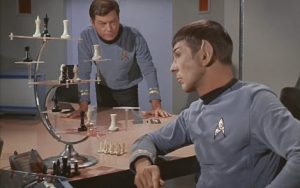 Watching The Original Series, I see a lot of that in Spock. It’s a similarly useful fiction. Do Vulcans really lack emotion? They might! I haven’t seen enough of the show to know for sure, but I do know that half-Vulcan Spock does not lack them.
Watching The Original Series, I see a lot of that in Spock. It’s a similarly useful fiction. Do Vulcans really lack emotion? They might! I haven’t seen enough of the show to know for sure, but I do know that half-Vulcan Spock does not lack them.
Instead, on some level he knows that if he allows others to believe that he lacks them — and if he convinces himself that he lacks them — he is able to maintain a kind of distance from others that both protects him from emotional pain and reinforces his value to the crew. Spock is often consulted when they need a strictly logical perspective. Anyone can provide a logical perspective, but Spock has made logic His Thing. Just as they might as well have Dr. McCoy patch up every wound, even though anyone can learn basic first aid. That’s why he’s there.
We see Spock demonstrate fondness. Playfulness. Selflessness. The only two-parter of the season, “The Menagerie,” is about his willingness to sacrifice his own career to give his disabled former captain a second chance at happiness.
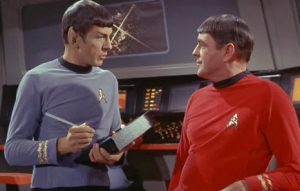 I’m willing to believe Witchers have a reduced emotional capacity, but I’m not sure I do believe it. Similarly, I’m willing to believe Spock being only half-human means he doesn’t experience the full range of emotion, but I can’t say for sure.
I’m willing to believe Witchers have a reduced emotional capacity, but I’m not sure I do believe it. Similarly, I’m willing to believe Spock being only half-human means he doesn’t experience the full range of emotion, but I can’t say for sure.
At the end of “This Side of Paradise” he says he’d never been truly happy before. I believe him when he says that, but the fact that he’s never been truly happy doesn’t mean he’s incapable of being happy. That’s what he meant, yes, but I don’t know that that’s the truth. Certainly having to consciously stamp down your own emotions is an unpleasant experience; being freed of that obligation for the duration of the episode…well, of course that would be the first time he experienced happiness. He let himself experience it.
I’ll be interested to see what they do with this, but I love that they didn’t wait several seasons to peel back the “lack of emotion” aspect of the character and reveal the truth. Instead, they more or less immediately cast doubt on it, and continued casting doubt on it throughout the season. The lack of emotion is a coping mechanism for Spock, not an inborn limitation. What could have been a one-dimensional character trait is immediately revealed to be deeper. It’s good characterization and it leaves so much room for exploration.
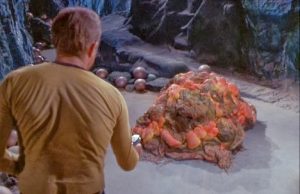 One thing I knew I’d enjoy was seeing high-minded concepts collide with weekly television budgets. And, sure enough, you have aliens who are just people painted another color. You have parasites that I’m pretty sure are made of novelty rubber vomit. In one episode, you have Kirk and Spock fighting a giant Meat-Lover’s Pizza.
One thing I knew I’d enjoy was seeing high-minded concepts collide with weekly television budgets. And, sure enough, you have aliens who are just people painted another color. You have parasites that I’m pretty sure are made of novelty rubber vomit. In one episode, you have Kirk and Spock fighting a giant Meat-Lover’s Pizza.
What I didn’t expect is how often the series is able to move beyond its cheapness and engage you in ways that are not bogged down by cost limitations. What I mean to say is that The Original Series has so far produced some truly compelling villains — however you’d like to define villains — and it’s done so while offering up visuals that dare you to take them seriously.
The best episodes let you understand what drives the force opposing Kirk & co. that week. A Godzilla Halloween costume in “Arena” ends up being in the right. In “A Taste of Armageddon,” a race fighting a centuries-long virtual war makes a damned good case for their horrifying reality. The pilot in “Tomorrow is Yesterday” is understandably mortified by the crew’s reluctance to return him home now that he’s seen a glimpse of the future. Our heroes are rarely revealed to be The Bad Guys, but they’re often shown to have their perspectives challenged, shaken, and broken.
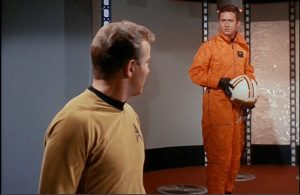 That’s something else I ended up enjoying a lot. I expected all-American spaceman Jim Kirk to be the perfect hero. Several times throughout the season, though, he was shown to have an awful lot in common with his enemies.
That’s something else I ended up enjoying a lot. I expected all-American spaceman Jim Kirk to be the perfect hero. Several times throughout the season, though, he was shown to have an awful lot in common with his enemies.
The best example is the episode-length game of cat and mouse that was “Balance of Terror,” but there are a few other great ones as well. In “Errand of Mercy,” he has a similar mindset to the conquering Klingons about how to deal with a neutral planet. Different methods, sure, but ultimately both sides end up in frustrated alignment in a way that’s downright chilling. In “Space Seed” he even expresses his admiration for conquerors like Khan. It’s important writing; the difference between Kirk and his adversaries isn’t that one is Good and one is Evil. The difference is far smaller than it might seem, and that balance could always tip the other way.
In fact, in “The Enemy Within,” Kirk is split into positive and negative versions of himself in a transporter accident, allowing us to see exactly how much shittiness he carries within him. And the fact that the positive Kirk is almost completely worthless at addressing the situation shows us that it’s not “perfection” that makes the character who he is.
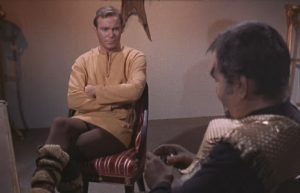 Don’t worry; we do get Perfect Kirk at various points. “Court Martial” is the worst offender, because it begins with a great concept — what if Kirk, under duress, made a bad decision that got someone killed? — and ends by painstakingly dismantling that concept so that we don’t have to question our hero after all. Even so, as of right now, “Court Martial” feels like the exception; Kirk often does make the right decision, but damned if we don’t see him suffer through the process of making it. He’s not perfect; he’s working hard, constantly, to get things right.
Don’t worry; we do get Perfect Kirk at various points. “Court Martial” is the worst offender, because it begins with a great concept — what if Kirk, under duress, made a bad decision that got someone killed? — and ends by painstakingly dismantling that concept so that we don’t have to question our hero after all. Even so, as of right now, “Court Martial” feels like the exception; Kirk often does make the right decision, but damned if we don’t see him suffer through the process of making it. He’s not perfect; he’s working hard, constantly, to get things right.
There’s not much I can say about the show that hasn’t been said elsewhere and better. But for such an important piece of TV history, I wanted to at least share that I’ve been watching it and get a few of my thoughts down in writing. All of them could be wrong. I might write up another one after season two and completely change my opinion.
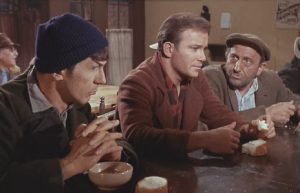 For now, though, it’s been an interesting experience. Season one of The Original Series started as one of the most frustrating things I’ve watched and ended as one of the most intriguing. It’s given me bad television to pick apart and great television to savor. Honestly, that’s everything I could have hoped.
For now, though, it’s been an interesting experience. Season one of The Original Series started as one of the most frustrating things I’ve watched and ended as one of the most intriguing. It’s given me bad television to pick apart and great television to savor. Honestly, that’s everything I could have hoped.
On to season two.
Oh, and, as your reward for being good, here is every season one episode of Star Trek: The Original Series ranked from worst to best. Come at me.
28) The Naked Time
27) The Man Trap
26) Charlie X
25) Shore Leave
24) The Squire of Gothos
23) Miri
22) Mudd’s Women
21) Where No Man Has Gone Before
20) The Menagerie
19) What Are Little Girls Made Of?
18) The Alternative Factor
17) Operation — Annihilate!
16) Arena
15) Court Martial
14) Return of the Archons
13) This Side of Paradise
12) Dagger of the Mind
11) The Corbomite Maneuver
10) The Enemy Within
9) Tomorrow is Yesterday
8) The Conscience of the King
7) The Devil in the Dark
6) The Gallileo Seven
5) Errand of Mercy
4) Space Seed
3) A Taste of Armageddon
2) The City on the Edge of Forever
1) Balance of Terror
Images throughout courtesy of Warp Speed to Nonsense.
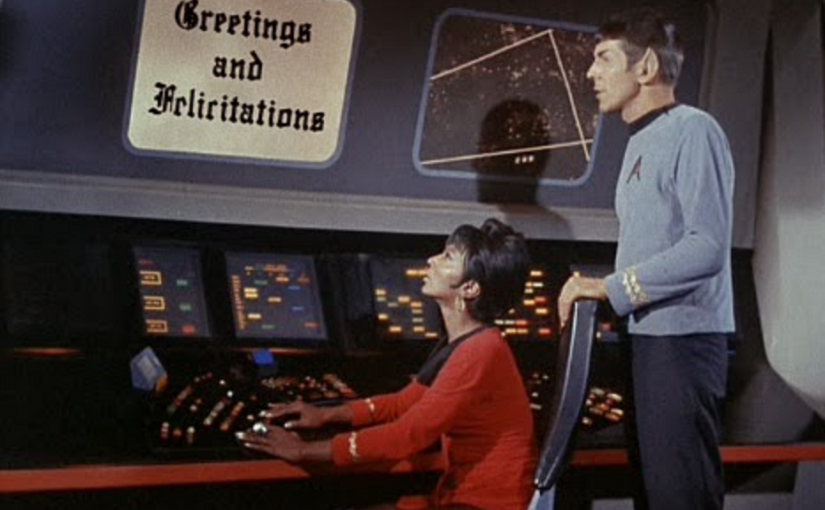
The thing I always say about Shatner’s acting style is that it isn’t his fault that “1920s German Expressionism” never became a common acting style for ’60s genre television.
Fun fact: there was a proposed episode along similar lines to “Tomorrow is Yesterday” where they accidentally abduct Hitler’s Dad and have to decide whether or not to give him a vasectomy before returning him. That is a thing they earnestly considered doing in this show.
As I have gotten older, I have regained much of my childhood affection for the original series on account of how willing it was to go completely nuts in ways that future incarnations of the show were far too serious and respectable to try.
I mean, until they decided to do a series whose main gimmick was that the ship was powered by magic mushrooms.
Speaking of childhood affection, I’ve been wondering how I’d have reacted to this show as a kid. So far, at least, I think it would come down to which episodes I caught. I can imagine being bored out of my mind by some of them, including some of my favorites. I guess part of the benefit of discovering the show as an adult is the patience that I have and the willingness to engage with it even when it’s at its worst. The benefit of discovering it as a kid, however, is that I wouldn’t have been picking holes in it, wondering about production difficulties, and laughing at the monsters. (I’d be too busy wetting myself.)
“They Saved Hitler’s Dad’s Fertility” is an amazing idea. I wonder how far along that got. My assumption is that they canned it because the end result would HAVE to be returning him as-is, and that would be difficult to justify. Then again, maybe it wouldn’t be difficult after all; just dream up some alternate future in which twice as many people die without Hitler…but that’s obviously problematic in itself.
Deciding to not do that episode was absolutely the right way to go, but I’d be lying if I said I weren’t interested in knowing how it would have turned out.
Ah, Star Trek, please let me write 50.000 words about it.
Well, maybe not today, but it makes me very happy that you watch it, and that you talk about it. Even if it isn’t episode by episode, I hope you will share more of your thoughts on one of my favourite franchises ever. Also, please do 500 posts about Buffy and Babylon 5, while you are at it.
I guess I should note that I’m kidding, but if you ever feel like talking about these things, I would love to read it.
Anyway, Star Trek: TOS. I watched Chalie X and The Man Trap as a child. As a teenager, I mainly watched the 90s stuff – TNG, DS9 and Voyager. I always thought TOS would be too old to be interesting.
I don’t remember why, but around 2012, I decided to give it a shot. And I was very positively surprised. Every episode (I swear, every single one) entertained me at least in some way. It might have been only, that I enjoyed it for it’s goofyness or even made a bit of fun for technical stuff, which sometimes looks funny today. But often, I found the ideas interesting. It doesn’t hurt, that I prefer slower TV anyway, modern shows are often to frantic, static camera is my prefered version by far, and I enjoy downtime and “filler” as world building moments. So, that TOS is slow was never a problem for me.
The problem with the storylines is, I guess, that the show is so old. I would imagine that back than, in the 60s (I think that was when the show was broadcast?), The Man Trap was genuinely surprising and clever. Instead of a horrible monster, there is an actual reason for the creatures behaviour. It is just hungry. Still dangerous, but it’s not just evil.
Charlie X is also, I find, pretty well done. He is happy to be around humans, but is also a teenager and way too powerful. At this age, it’s no wonder that he can’t control himself. I always enjoy, how the episode slowly increases the danger, and how Charlie first looks up to Kirk, until there is a breaking point. But even here, the episode gives him sympathetic elements. His choices are very flawed. He would need guidance from someone, who could actually keep his power in check, but still be a human with emotions. The end is chilling. Going back is obviously horrible for him.
TOS doesn’t really do easy answers, or at least not often, as far as I remember.
With regards to Bones, I’m actually surprised that you never heard of him. TOS has basically him, Kirk and Spock as the main characters, the others are far less important. Uhura, Sulu, Chekov and Scotty are important (just for the fact that, back then, there was an international crew on this ship), but they never get much playtime. It’s a shame, but it’s how the setup is supposed to work.
Spock and Bones are basically Kirks main advisors and friends. Spock is the guy, who tries to look logically at a problem, whereas Bones looks at it from an emotional level. And do show works pretty well with it, I thought. But again, it’s a long time, since I have watched it, so details might be murky.
That said, I remember not liking Bones a lot, because he tends to get very antagonistic against Spock. It didn’t always feel, like there was a basic respect there, for his competent colleague. But again, maybe I misremember wrong here.
Spock was clearly my favourite, and I always was impressed by how much Nemoy could express by just moving his eyes. And exploring the nature of him being half-human, half-vulcan is pretty well done, considering the time. I guess, I actually don’t know any other shows from back than. Later shows go a bit more into details with Vulcans. And it is clear that they, too, have emotions, they just like everyone to think they don’t, including themselves. Spock just has a harder time to cope with his emotions, due to his half-human nature.
I’m very happy to see, that “Balance of Power” is your favourite episode of the bunch. I find it excellent, and love how it reflects the mortal enemy (well, one of the two) of the Federation back at them. The captain of the Romulan crew is basically Kirk, if Kirk had grown up as a Romulan. He isn’t a skeeming villain, just someone who is equally competent as Kirk, with different values taught to him. It’s a very well done episode.
It makes me a bit sad that you didn’t like “Charlie X” and “The Squire of Gothos” more. But I guess these episodes about omnipotent beings, who play with the Enterprise, are very much a matter of taste. I always enjoyed them, and love Trelaine as a villain. Dunno, something about antagonists who really enjoy being jerks, works very well for me. I like villains who have fun.
Space Seed is also an excellent episode, with Khan being a very well done antagonist. And I like how it gives us more backstory for Earth.
Thanks for writing about your impressions. I hope there will be more (no pressure, though ;) ).
Also, I forgot to ask: I guess you had some ideas about Kirks personality, right? Did the actual Kirk meet them?
Back when I watched the show, I was very surprised how much of a no-nonsense captain he actually is. I feel like we remember him, generally, as Zapp Brannigan, which didn’t feel true for me, at all. He felt competent, and only let his mask of the tough captain down, when he talked to Spock or Bones in private, or if there was a crewman, who needed some help.
Kirk has suffered mightily from the fact that Shatner himself is such a, ahem, personality, that you kind of want to store Kirk in your head as a rough caricature. His much-assumed arrogance, in the classic series, is more a hypertrophied sense of responsibility. His famous womanizing is like six instances of him falling legitimately in love. And his rulebreaking is always the exception to his mostly being a stiff, hard-nosed military man.
Do people accuse him of rule breaking? The thing that every captain in any Star Trek series does?
In his case, it’s even more silly. The federation is still pretty young, and he explicitely goes, where no man has gone before. Of course he has to adjust to situations on the fly.
There is so much here to respond to! There will be a season two post, and soon, so I’ll probably do much of it there. Regardless, I see it and I’m not ignoring it!
I thought I’d respond to a bunch of this in my season two post, but I ended up rambling about other things so I WILL DO IT HERE AFTER ALL.
I definitely had heard of Bones (thanks to “He’s dead, Jim,” and “I’m a doctor, not yo mama”) but, in my mind, he was just some dude on the show with a couple of catchphrases. I had no idea what an important presence he was in most episodes, and I had even less of an idea of how fuckin’ awesome the guy is. I get why Kirk and Spock take up most of the discourse (one is the star, one is the alien) but, man, Bones deserves so much more attention.
I see what you’re saying about his insults toward Spock, but it seems like Spock consistently gives it back to him at least as well. There is a begrudging respect between them (and they each relish it when respect from the other bleeds through), at the very least, and I always figured that the two of them enjoy needling each other. I could be wrong (and it could even be disproven at some point) but I think that if either of them ended up taking genuine offense, the other would feel pretty bad about it. I’ve just taken it so far as being their personal dynamic.
“Charlie X” suffered, for me, from awful pacing. It was a great idea that felt like a half-hour story stretched over a full hour. Neat ideas, but it felt more like a Twilight Zone episode. And it was! “The Squire of Gothos” didn’t do much for me, but gooooooood lord was Trelaine great. Absolutely brilliant guest performance that deserved a more engaging story.
I definitely had some preconceived notions about Kirk, and I think Ross hit the nail on the head about them. I expected someone a little pigheaded, a bit self-important, someone painted like a conquering hero even though he comes across as a putz…and, yeah, that’s probably because Shatner the man and Kirk the character have gotten conflated in pop-culture portrayals since.
And that’s okay! It does lead to one hell of a pleasant surprise when you check out the source material, though. He’s a truly excellent character, and because the bar of expectations had been set so low, he ends up looking even better by comparison.
Again, the writing fails him at certain points (as it does everybody else), but on the whole he’s a remarkably well-realized and recognizable human being. I kinda love the guy!